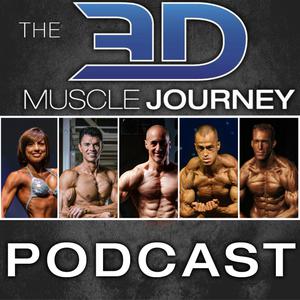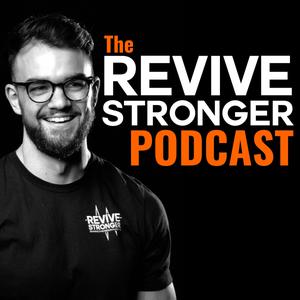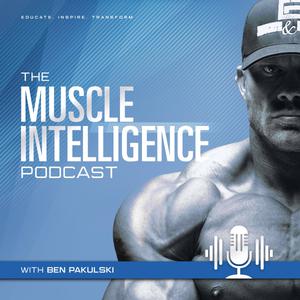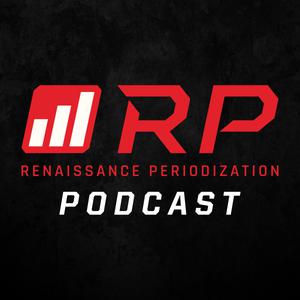
Iron Culture
Eric Helms & Omar Isuf
- 1 hour 31 minutesEp. 271 - Powerlifting, Natural Bodybuilding & Science (Eric Trexler’s Journey)
Trextopia, this is your episode. We peel back the layers of pro natural bodybuilder, exercise science researcher & co-host of Iron Culture, Eric Trexler.
Learn how he got into lifting, what low bar squatting 500lb ATG will do to your body & why there might be more controversy in Iron Culture’s near future. This might be the peak of Iron Culture but Trexler is no fan of peak weeks.
00:00 Introduction to an episode with Eric without the other Eric
03:06 An inside peak into Trexler’s day as a scientist (Trex lore)
09:42 Trexler’s foray into powerlifting
19:47 T-Nation and what informed Trexler’s training practices
27:12 Wrestling, lifting, and experimenting with training
36:02 Change of perspective: different approaches to training
42:44 The evolution of Trexler’s training and getting into science
48:37 “Optimisation” for bodybuilding and peaking (Helm’s hat cameo)
1:00:45 The pros and cons of different approaches
1:04:53 Diving into different research topics and the recent challenges in Trexler’s fitness journey
1:16:57 Growing and learning from the experiences (and the return of the T-Rex)
1:30:41 Closing out this monster episode
22 April 2024, 10:00 am - 1 hour 41 minutesEp. 270 - Scientific Retractions Aren’t Working
We here at Iron Culture have been on a mission to better inform you, dear listener, as to the inner workings of science. From what goes on in the lab itself, to the publication process, to dissemination, to eventual meta-analysis, the challenge of interpretation and communication of science, the optimistic promises of open science, and the increasing focus on replication, it’s been a hopefully eye-opening and overall encouraging discussion. However, while the scientific method is inherently self-correcting, the apparatus of science is far from perfect and there is a big problem with its principle tool of correcting the peer-reviewed record: retraction. What leads to a paper being retracted? What is the process? How does it impact the literature? Most importantly, does it effectively change the understanding of the science in the community the studies are meant to serve? Join the Erics in this most recent episode as they break it all down!
00:00 Retraction in science and a recently retracted study on cold water immersion
Néma 2024 Impact of cold exposure on life satisfaction and physical composition of soldiershttps://pubmed.ncbi.nlm.nih.gov/36599485/
Iron Culture Ep. 267- Addressing Data Fraud in Nutrition Science https://www.youtube.com/watch?v=YZqQ0_pweTs
16:00 A peak behind the sport science curtain
25:19 The process of retraction and its flaws
Soria-Gila 2015 Effects of Variable Resistance Training on Maximal Strength: A Meta-Analysishttps://pubmed.ncbi.nlm.nih.gov/25968227/
Retraction Watch https://retractionwatch.com/
41:15 Keeping up to date with retractions and critically appraising studies
Wakefield 1998 Ileal-lymphoid-nodular hyperplasia, non-specific colitis, and pervasive developmental disorder in children https://pubmed.ncbi.nlm.nih.gov/9500320/
1:00:54 Wild claims from science communicators and their responsibility
1:11:09 Letter to the editor and the retraction process
Phillips 2017 Changes in body composition and performance with supplemental HMB-FA+ATPhttps://pubmed.ncbi.nlm.nih.gov/28301440/
1:22:53 The open science movement and the dangers of unreliable findings
1:30:04 Moving forward: the effective science communicatorand alternative publishing models
1:39:16 Closing out this intervention episode for Helms
15 April 2024, 10:00 am - 1 hour 34 minutesEp. 269 - Are Social Media PhDs Ruining Fitness? (feat Dr. Milo Wolf, Max Coleman & Dr. Pak)
Whitney Houston said it best: “I believe the children are our future, teach them well and let them lead the way.” Here at Iron Culture, we’re old, irrelevant and out of touch. But, we believe in platforming the next generation of educators to carry on the torch (or at least pandering so they’ll platform us in return when we can no longer pay the bills). In this Roundtable we’re joined by Dr. Milo Wolf, Dr. Pak, and first-time guest Max Coleman, to discuss the challenges of growing a following using social media in 2024 as an evidence-based content creator. The game has changed what worked for us, won’t be as successful, and striking the right balance is not easy, and getting it wrong comes with lashback. Are we all just doing more harm than good? Join us as we discuss!
00:00 Ignoring our actual guests and introducing Jim Powers
05:06 Actually introducing the young pioneers and getting into the topic
13:22 Milo’s thoughts and using the hook of the title and the thumbnail
Iron Culture Ep. 268- Science Communication, Gatekeeping & The Fitness Industry https://www.youtube.com/watch?v=bOuoJoF5IDA
20:43 The rise of Eric’s visibility and gaining a foothold in social media fitness
28:52 Dr. Pak’s perspective and how he shapes his content
36:28 Playing the social media game
49:18 Nuance, and (finally) getting Max Coleman’s viewpoint
1:00:54 Doing it for the fame, the saturation of the landscape, and finding yourself within it
1:10:24 Milo’s tips for new content creators (one weird trip to explode your social media presence)
1:22:05 Max’ favourite movies and some applications to takeaway
1:33:20 Closing out and where to find our guests (to increase their subscriber count by 2)
Milo https://www.youtube.com/@WolfCoaching, IG @wolfcoach_ , wolfcoaching.com
Dr Pak https://www.youtube.com/@Dr__Pak IG @dr__pak , drpak.com
Max IG @coleman.et.al
8 April 2024, 10:00 am - 1 hour 55 minutesEp. 268 - Science Communication, Gatekeeping & The Fitness Industry (feat Dr. Pak)
Dr. Pak is back on Iron Culture for his third appearance! This time, he sat down with Omar and Dr. Helms for a meta-discussion on the challenges of science communication. How do you maintain credibility when you’re using social media as a science communication tool? This challenge has changed, but it isn’t new by any means. The “Sagan effect” describes the well-researched phenomenon by which the scientific community perceives other scientists who get more media exposure as less legitimate scientists - despite the fact that, on average, scientists more active in science communication typically publish slightly more often and with a higher impact than scientists less active in science communication. In modern times, however, the incentive structures are different, and many instances of expert creep, “selling out” and pseudoscience have been propagated on social media by some academics or members of the medical community. In this episode we discuss the challenges of attempting to communicate science without being criticized for doing so, how this has and hasn’t changed over time, and the instances of gatekeeping which are ultimately counterproductive to increasing scientific literacy.
00:00 Introduction to Helms Haven/Deep
04:57 The Dr Pak Trilogy and The Grizzly at the Raskol booth at the Arnold
16:13 The Grizzly backstory
32:52 Pak’s experience with The Grizzly
42:43 The academic and the memer
52:18 The scientific community and public scientists
Martinez-Conde 2016 Has Contemporary Academia Outgrown the Carl Sagan Effect? https://pubmed.ncbi.nlm.nih.gov/26888919/
1:13:53 Getting the reps in within the science communication game and being critiqued
1:35:00 Academics and science communicators across social media platforms
1:42:35 The closing pieces to this monster episode
Where to find Dr. Pak
Instagram: @dr__pak https://www.instagram.com/dr__pak/
YouTube: @Dr__Pak https://www.youtube.com/@Dr__Pak
Website: https://www.drpak.com/
1 April 2024, 10:00 am - 1 hour 34 minutesEp. 267 - Addressing Data Fraud in Nutrition Science
The holy trinity is back and holy smokes do we have a Holy Ghost of an episode! First, to kick things off the crew discusses the recent “March madness” of powerlifting that just finished: IPF European Champs, the UK Arnold, and Powerlifting America Nationals. Some absolutely stunning performances occurred all over the world in powerlifting and it seems the rising tide of talent has no end. Then we get into the meat - or should I say the bottomless soup - of the episode. While fraud in research is exceedingly rare, it does happen, and unfortunately, more common issues such as p-hacking are a far more prevalent issue. What is to be done in situations like this? One tool, as the Erics discuss, is replication.
00:00 An intro in unison (as always) and Trexler the bouncer
MASS Research Review https://massresearchreview.com/
Raskol Apparel https://raskolapparel.com/
10:20 Introducing more Trex lore
14:42 Powerlifting America Nationals, Arnold UK, and IPF European Champs recap
34:45 Trexler yawn-gate rears its head again and some numbers behind tzhe sport
54:37 Trexler’s return and getting into the science of replication
1:10:08 The bottomless soup bowl
Wansink 2005 Bottomless bowls: why visual cues of portion size may influence intake https://pubmed.ncbi.nlm.nih.gov/15761167/
Lopez 2024 Visual cues and food intake: A preregistered replication of Wansink et al. (2005) https://pubmed.ncbi.nlm.nih.gov/37917442/
Vigotsky 2022 Improbable data patterns in the work of Barbalho et al. https://osf.io/preprints/sportrxiv/sg3wm
George 2015 Data fraud in clinical trials https://pubmed.ncbi.nlm.nih.gov/25729561/
1:19:41 What is a successful replication?
1:29:10 Closing out with a brief history of violence
25 March 2024, 10:00 am - 1 hour 26 minutesEp. 266 - Are Plant-based Proteins Actually Superior?
After their recent reconciliation, the Erics got together for this duo episode to bond over their mutual love of protein. But, dear listener, this might not be the home-cooked high-protein meal you hoped for. Dr. Trexler tackles the question of whether or not, GASP, protein restriction might extend lifespan! Then, to add insult to injury, the Erics dig into the question of whether or not plant-based protein sources could be superior to animal sources for improving healthy aging! Along the way, you’ll also learn about the limitations of both epidemiological and mechanistic protein research, and how the two can complement each other to lead to more robust conclusions. So grab your pea protein shakes - or maybe your protein-free placebo - and tune in for another monster episode of Iron Culture.
00:00 Introduction to another Eric duo episode and protein restriction?!
https://massresearchreview.com/
12:10 Caloric restriction for longevity
Speakman 2007 Starving for life: what animal studies can and cannot tell us about the use of caloric restriction to prolong human lifespan https://pubmed.ncbi.nlm.nih.gov/17374682/
24:23 Protein restriction for longevity
Speakman 2016 Calories or protein? The effect of dietary restriction on lifespan in rodents is explained by calories alone https://pubmed.ncbi.nlm.nih.gov/27006163/
Korat 2024 Dietary protein intake in midlife in relation to healthy aging - results from the prospective Nurses' Health Study cohort https://pubmed.ncbi.nlm.nih.gov/38309825/
36:49 Protein sources, healthy ageing, and methionine restriction
Richie 2023 Dietary Methionine and Total Sulfur Amino Acid Restriction in Healthy Adults https://pubmed.ncbi.nlm.nih.gov/36806866/
44:30 Dosages to maximise outcomes
Morton 2018 A systematic review, meta-analysis and meta-regression of the effect of protein supplementation on resistance training-induced gains in muscle mass and strength in healthy adults https://pubmed.ncbi.nlm.nih.gov/28698222/
Nunes 2022 Systematic review and meta-analysis of protein intake to support muscle mass and function in healthy adults https://pubmed.ncbi.nlm.nih.gov/35187864/
57:52 Plant vs animal sources of protein and accompanying food
Zou 2020 mTOR signaling pathway and mTOR inhibitors in cancer: progress and challenges https://pubmed.ncbi.nlm.nih.gov/32175074/
1:08:53 Planting the flag on this study
1:14:08 Nutrition science and study design discussion
1:24:23 Eat your vegetables and bringing back the third host next time
18 March 2024, 10:00 am - 1 hour 33 minutesEp. 265 - Are Your Supplements Contaminated?
As you know, Iron Culture reps the neutral to positive gang around these parts. While most new supplements released to the market don’t pan out as effective, some do. So, if preliminary data supports the potential efficacy of a new supplement, why not try it out? The only potential downside of trying a new supplement is wasted money, right? Not so fast. In this episode the Erics duo explains why the typical supplement consumer is not accurately weighing the true potential cost of supplement investment. Unbelievably, some data indicates 10-30% of all supplements are contaminated - you heard that right. Could that be true? If so, why and how is this happening and what can you do about it? Join us to find out!
00:00 A successful intro
07:40 Supplements and the Helms algorithm for recommendations
https://massresearchreview.com/
Trexler 2014 Metabolic adaptation to weight loss: implications for the athlete https://pubmed.ncbi.nlm.nih.gov/24571926/
14:41 Breaking down Trexler’s supplement tier list
26:26 Why caffeine is not a Tier 1 supplement
Gardiner 2023 The effect of caffeine on subsequent sleep: A systematic review and meta-analysis https://pubmed.ncbi.nlm.nih.gov/36870101/
35:33 Weighing up the pros and cons of supplements and issues in sports
Burke 2023 The Effects of Creatine Supplementation Combined with Resistance Training on Regional Measures of Muscle Hypertrophy: A Systematic Review with Meta-Analysis https://pubmed.ncbi.nlm.nih.gov/37432300/
Lauritzen 2022 Dietary Supplements as a Major Cause of Anti-doping Rule Violations https://pubmed.ncbi.nlm.nih.gov/35399596/
Geyer 2004 Analysis of non-hormonal nutritional supplements for anabolic-androgenic steroids - results of an international study https://pubmed.ncbi.nlm.nih.gov/14986195/
Yun 2017 Monitoring of the amphetamine-like substances in dietary supplements by LC-PDA and LC-MS/MS https://pubmed.ncbi.nlm.nih.gov/30263651/
Matthews 2018 Prohibited Contaminants in Dietary Supplements https://pubmed.ncbi.nlm.nih.gov/28850291/
Jagim 2023 Prevalence of adulteration in dietary supplements and recommendations for safe supplement practices in sport https://pubmed.ncbi.nlm.nih.gov/37841887/
Tucker 2018 Unapproved Pharmaceutical Ingredients Included in Dietary Supplements Associated With US Food and Drug Administration Warnings https://pubmed.ncbi.nlm.nih.gov/30646238/
1:05:37 How banned substances can negatively affect you and where to read the FREE cover story
https://www.strongerbyscience.com/new-supplement/
1:13:33 The concept of 3rd party testing and licensing
1:24:26 Final thoughts on the topic
1:32:17 Closing out this double Eric episode
11 March 2024, 10:00 am - 1 hour 53 minutesEp. 264 - Why the “52 Set Study” Doesn’t Matter
Evidence-based practice has unfortunately become a meme, and its meaning, role, and utility are less understood than they were just a handful of years ago. In this episode we dive deep, discussing how to incorporate study findings into practice. If you don’t have the ability to gauge the impact of a study’s findings, how do you stay up to date? We answer critical questions like: How does the hierarchy of evidence operate in a field where many meta-analyses have errors? What is the role of mechanistic research compared to applied research, and when should you look to each to inform what you do in the trenches? At a time when many seem ready to simply throw in the towel on the evidence - despite it actually being of a higher quality, than it ever has been, we are here. We are going to bring you back from the brink so that you can make those sweet, sweet evidence-based gains.
00:00 Revealing some of the mystery of the cult
https://massresearchreview.com/
Iron Culture Ep. 263- Is Protein Timing Debunked? https://www.youtube.com/watch?v=9AyX9Uzek2U
08:41 Getting into it before the 10 minute mark
12:23 Actually kicking it off… The hierarchy of evidence and meta-analyses
Kadlec 2023 With Great Power Comes Great Responsibility: Common Errors in Meta-Analyses and Meta-Regressions in Strength & Conditioning Research https://pubmed.ncbi.nlm.nih.gov/36208412/
32:44 So what actually is a meta-analysis? And which ones to read
42:57 Changes in paradigms
Schoenfeld 2017 Strength and Hypertrophy Adaptations Between Low- vs. High-Load Resistance Training: A Systematic Review and Meta-analysis https://pubmed.ncbi.nlm.nih.gov/28834797/
Baz-Valle 2022 A Systematic Review of The Effects of Different Resistance Training Volumes on Muscle Hypertrophy https://pubmed.ncbi.nlm.nih.gov/35291645/
Enes 2024 Effects of Different Weekly Set Progressions on Muscular Adaptations in Trained Males: Is There a Dose-Response Effect? https://pubmed.ncbi.nlm.nih.gov/37796222/
Damas 2016 Resistance training-induced changes in integrated myofibrillar protein synthesis are related to hypertrophy only after attenuation of muscle damage https://pubmed.ncbi.nlm.nih.gov/27219125/
Robinson 2023 Exploring the Dose-Response Relationship Between Estimated Resistance Training Proximity to Failure, Strength Gain, and Muscle Hypertrophy: A Series of Meta-Regressions https://sportrxiv.org/index.php/server/preprint/view/295
57:17 Sources of information and the carrot of capitalism
1:09:19 The research chain and when it should be broken
1:26:26 What we do when we don’t get the study that we want
Smith 2003 Parachute use to prevent death and major trauma related to gravitational challenge: systematic review of randomised controlled trials https://pubmed.ncbi.nlm.nih.gov/14684649/
1:41:32 The final thoughts and a teaser for next time
4 March 2024, 11:00 am - 1 hour 26 minutesEp. 263 - Is Protein Timing Debunked?
It's time for a MONSTER episode about protein. Naturally, Helms has recused himself because of his heavy biases and conflicts of interest with the shadowy figures behind Big Protein. As a result, Trex and Omar take a trip down memory lane and discuss everything we used to know about protein, and how a surprising percentage of that knowledge has changed over the last decade or so of research.
It wouldn't be fair to say that everything you thought you knew about protein is wrong, but there's no question that evidence-based protein guidelines have been significantly impacted by some paradigm-shifting studies that have occurred in the last few years. In this episode, Trex and Omar discuss what these new studies have taught us about protein, and how we can put this new information into action.
00:00 Intro to another episode with controversy (Helms’ one week suspension from the cult)
9:51 Trex leading the charge on protein timing
23:12 The limitations and applications of mechanistic research
MASS Office Hours https://www.youtube.com/@MASSResearchReview
MASS Research Review https://massresearchreview.com/
30:40 A short detour to muscle hypertrophy and the pump
35:17 Protein ingestion and the anabolic response: breaking down the latest study
Trommelen 2023 The anabolic response to protein ingestion during recovery from exercise has no upper limit in magnitude and duration in vivo in humanshttps://pubmed.ncbi.nlm.nih.gov/38118410/
56:00 Has protein distribution and timing been debunked?The takeaways
Taguchi 2021 Increasing Meal Frequency in Isoenergetic Conditions Does Not Affect Body Composition Change and Appetite During Weight Gain in Japanese Athleteshttps://pubmed.ncbi.nlm.nih.gov/33361498/
Yasuda 2020 Evenly Distributed Protein Intake over 3 Meals Augments Resistance Exercise-Induced Muscle Hypertrophy in Healthy Young Menhttps://pubmed.ncbi.nlm.nih.gov/32321161/
1:04:49 Quantifying (un)certainty and applying caveats
1:14:53 Omar and Trex’s history with protein
1:25:52 Closing out another monster episode
26 February 2024, 6:29 pm - 1 hour 25 minutesEp. 262 - Sheffield 2024 Recap
The trio is back on the heels of THE Sheffield 2024, the biggest powerlifting competition to date, which outdid its inaugural 2023 performance. Once again, the 12 best IPF-unequipped women and men clashed in a cross-weight class competition ranked by their total as a percentage of their respective world record. This meet incentivizes going BIG, rewarding cash prizes for both placing and breaking individual lift records, with over $500k USD up for grabs, boy did it deliver. The sold out crowd watched the first ever 300kg women’s squat in sleeves by Sonita Muluh, and Jesus Olivares break Ray Williams’ squat world record. Women’s champion Agata Sitko totalled an astonishing 600kg at 69kg, benching an incredible 152kg, annihilating the 69kg total record by 51kg alongside 10 additional women who totalled over the world record. Without question, powerlifting is on the rise, and there is a lot to discuss, so make sure to listen in!
00:00 A synchronised intro, reviewing reviews, and an Iron Culture goal
12:30 Moving onto Sheffield 2024: the rundown
22:00 Development in the sport of Powerlifting
29:03 The men’s side and the KoTL predictions
42:02 Trexler’s take and the limitations measuring the body composition of large individuals
Slater 2011 Nutrition guidelines for strength sports: sprinting, weightlifting, throwing events, and bodybuilding https://pubmed.ncbi.nlm.nih.gov/21660839/
1:02:42 Segue back to Sheffield and some insider information
1:13:43 What Sheffield means for Powerlifting and a broad recap
1:17:39 Trexler addresses the nasty rumours and men’s physique before we close out
Iron Culture Ep. 33- Pain Science, Injury & Rehab https://www.youtube.com/watch?v=B-S8nThxpqY
19 February 2024, 11:00 am - 1 hour 21 minutesEp. 261 - A Unified Theory of Metabolic Adaptation?
The nerd super duo is back at it again. This time, Dr. Trexler plays Sherlock and Dr. Helms plays Watson in a discussion of how overtraining syndrome, metabolic adaptation, relative energy deficiency in sport, exercise energy compensation, body fat regulation, and more, are both distinct from one another, yet are all also closely related. Surprisingly, it took a couple meat head bodybuilders to notice the shared characteristics and overlap between these separate concepts. That’s precisely because bodybuilders are crazy enough to go through a process that often results in their simultaneous occurrence! Listen in to find out what these concepts are, when they intersect as well as diverge, how you can identify which you or your clients are experiencing, and what to do about it.
00:00 A (kind of) synced up intro and an appearance from Omar
02:04 A brainstorming session on metabolism
https://massresearchreview.com/
Omar Isuf - Why You Shouldn’t Try To Be “Shredded” https://www.youtube.com/watch?v=GmlGt49Oi1I
https://www.strongerbyscience.com/stay-shredded/
08:30 Low energy availability and the female athlete triad
Areta 2021 Low energy availability: history, definition and evidence of its endocrine, metabolic and physiological effects in prospective studies in females and males https://pubmed.ncbi.nlm.nih.gov/33095376/
23:20 Energy availability and body fat
Loucks 2003 Energy availability, not body fatness, regulates reproductive function in women https://pubmed.ncbi.nlm.nih.gov/12882481/
29:15 Relative Energy Deficiency in Sport and the drivers of metabolic adaptation
Burke 2023 Mapping the complexities of Relative Energy Deficiency in Sport (REDs): development of a physiological model by a subgroup of the International Olympic Committee (IOC) Consensus on REDs https://pubmed.ncbi.nlm.nih.gov/37752007/
Mountjoy 2023 2023 International Olympic Committee's (IOC) consensus statement on Relative Energy Deficiency in Sport (REDs) https://pubmed.ncbi.nlm.nih.gov/37752011/
Hackney 2005 Testosterone and endurance exercise: development of the "exercise-hypogonadal male condition https://pubmed.ncbi.nlm.nih.gov/16268050/
Hackney 2020 Hypogonadism in Exercising Males: Dysfunction or Adaptive-Regulatory Adjustment? https://pubmed.ncbi.nlm.nih.gov/32082255/
48:07 Overtraining syndrome
Stellingwerff 2021 Overtraining Syndrome (OTS) and Relative Energy Deficiency in Sport (RED-S): Shared Pathways, Symptoms and Complexities https://pubmed.ncbi.nlm.nih.gov/34181189/
Iron Culture Ep. 149- Overreaching, Overtraining, and Insufficient Recovery: Everything You Need To Know https://www.youtube.com/watch?v=ZxohJX_F-XY
55:08 Energy constraint and compensation
Dolan 2023 Energy constraint and compensation: Insights from endurance athletes https://pubmed.ncbi.nlm.nih.gov/37557979/
1:05:13 A practical spin: bringing all the information together
1:20:07 Closing out with a shoutout to our sponsor: The RED-S calorie-free food van
12 February 2024, 11:00 am - More Episodes? Get the App
Your feedback is valuable to us. Should you encounter any bugs, glitches, lack of functionality or other problems, please email us on [email protected] or join Moon.FM Telegram Group where you can talk directly to the dev team who are happy to answer any queries.
 3D Muscle Journey
3D Muscle Journey
 The Revive Stronger Podcast
The Revive Stronger Podcast
 Barbell Medicine Podcast
Barbell Medicine Podcast
 Muscle Intelligence
Muscle Intelligence
 Dave Tate's Table Talk
Dave Tate's Table Talk
 RP Strength Podcast
RP Strength Podcast